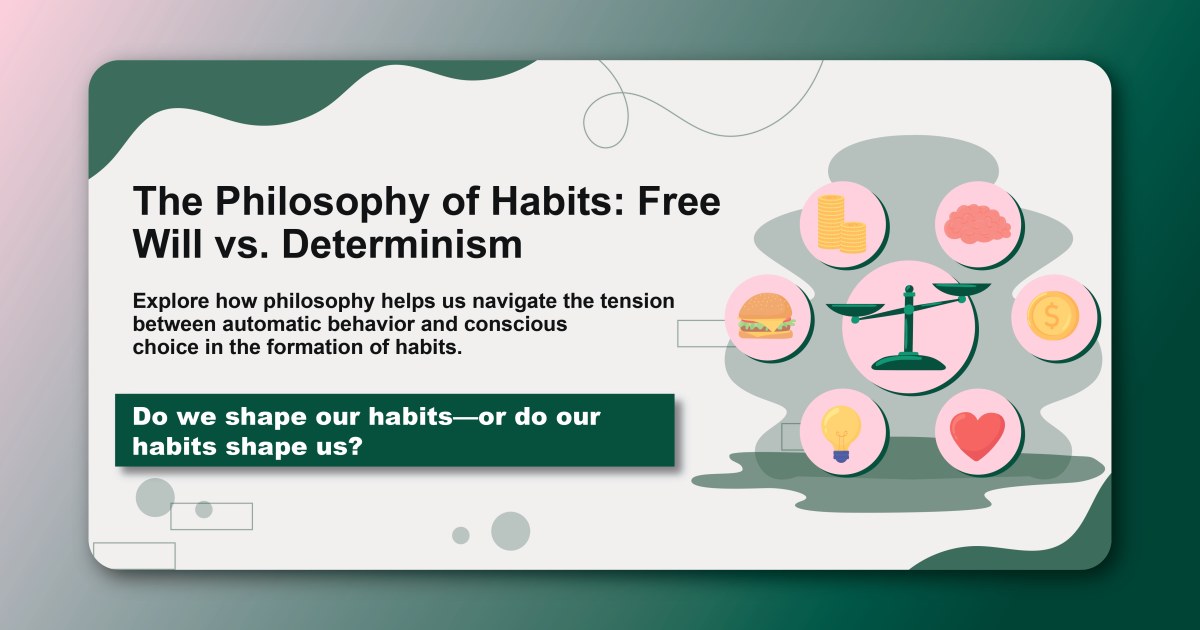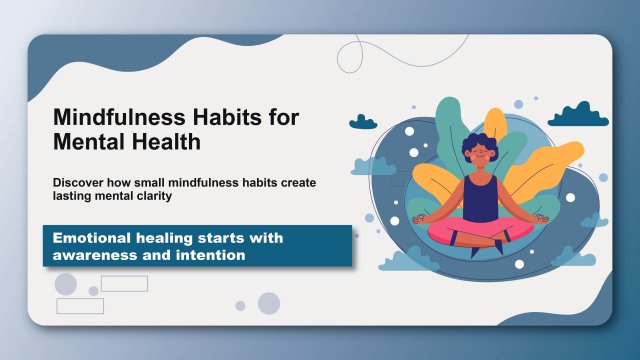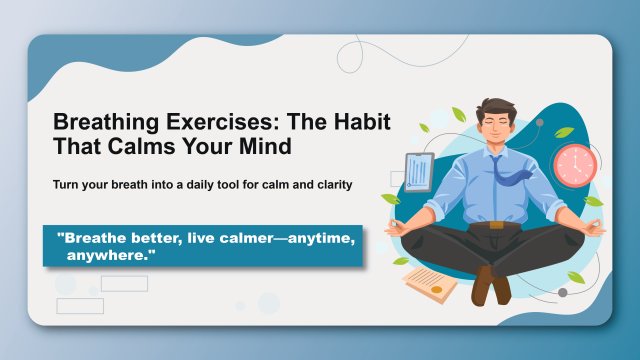The study of habits inevitably leads us to fundamental philosophical questions about the nature of human agency, free will, and determinism. When we examine the automatic nature of habitual behavior alongside our capacity for conscious choice and change, we encounter one of philosophy's most enduring debates. Do we truly choose our habits, or are they the inevitable result of biological, psychological, and social forces beyond our control? This question has profound implications for how we understand personal responsibility, moral agency, and the possibility of meaningful behavior change.
The philosophical exploration of habits reveals the complex interplay between automatic processes and conscious decision-making that characterizes human behavior. While neuroscience shows us that habits operate through specific brain circuits that can function below the threshold of conscious awareness, we also observe that people can and do successfully change their habits through deliberate effort and conscious choice. This apparent paradox – that we can be both determined by our habits and free to change them – requires careful philosophical analysis.
Different philosophical traditions have approached this question from various angles, offering insights that can inform our understanding of habit formation and change. From the ancient Stoics who emphasized the power of rational choice over automatic responses, to contemporary philosophers who explore the relationship between consciousness and behavior, each perspective contributes to our understanding of what it means to be a habit-forming being with the capacity for self-transformation.
The practical implications of this philosophical inquiry extend far beyond academic debate. How we understand the relationship between freedom and determinism in habit formation affects everything from personal development strategies to addiction treatment approaches, from educational methods to legal concepts of responsibility. It influences how we think about praise and blame, success and failure, and the very possibility of personal growth and change.
This exploration doesn't seek to resolve the free will versus determinism debate definitively – philosophers have been grappling with these questions for millennia. Rather, it aims to illuminate how different philosophical perspectives can enrich our understanding of habits and inform more thoughtful approaches to behavior change that honor both our automatic nature and our capacity for conscious choice.
The Determinist Perspective on Habits
Biological Determinism and Habit Formation
Neural Mechanisms as Determining Factors From a strict determinist perspective, habits are the inevitable result of biological processes that operate according to natural laws.
Biological Determinism Arguments:
- Habits emerge from specific neural pathways and brain circuits
- Neurotransmitter systems and genetic factors influence habit formation
- Evolutionary pressures have shaped habit-forming mechanisms
- Brain structure and function determine behavioral patterns
- Hormonal and neurochemical influences drive habitual behaviors
Determinist Implications:
- Habit formation follows predictable biological laws
- Individual differences in habit capacity are biologically determined
- Intervention success depends on working with biological constraints
- Free will is an illusion created by complex neural processes
- Moral responsibility for habits is questionable if behavior is determined
Environmental and Social Determinism
External Forces Shaping Behavioral Patterns Environmental and social factors can be seen as determining forces that shape habits regardless of individual choice.
Environmental Determinism:
- Physical environment structures behavioral opportunities
- Social context and cultural norms determine acceptable habits
- Economic conditions influence available behavioral choices
- Family and peer influences shape habit formation patterns
- Media and technology create deterministic behavioral responses
Social Determinism Arguments:
- Habits are socially constructed and culturally determined
- Individual agency is limited by social structures and expectations
- Class, race, and gender influence habit formation opportunities
- Social learning and modeling determine behavioral patterns
- Collective behavior patterns override individual choice
Psychological Determinism
Mental Processes as Determining Factors Psychological theories suggest that habits are determined by unconscious mental processes and past experiences.
Psychological Determinism:
- Unconscious drives and motivations determine behavior
- Past experiences and trauma shape automatic responses
- Cognitive biases and mental patterns determine choices
- Personality traits and psychological profiles predict habits
- Mental health conditions influence habit formation capacity
Developmental Determinism:
- Early childhood experiences determine adult habit patterns
- Attachment styles influence habit formation capacity
- Developmental stages determine behavioral possibilities
- Genetic predispositions interact with environmental factors
- Psychological development follows predictable patterns
The Free Will Perspective on Habits
Libertarian Free Will and Conscious Choice
Genuine Agency in Habit Formation The libertarian free will perspective argues that humans possess genuine agency that allows for real choice in habit formation and change.
Free Will Arguments:
- Conscious reflection can override automatic habit responses
- Deliberate choice and intention can create new behavioral patterns
- Humans have the capacity for self-determination and self-creation
- Moral responsibility requires genuine freedom of choice
- Personal transformation demonstrates real agency
Agency Characteristics:
- Ability to consider alternatives and make conscious choices
- Capacity for self-reflection and meta-cognitive awareness
- Power to resist impulses and override automatic responses
- Capability for rational deliberation and value-based decision making
- Potential for self-transformation and character development
Compatibilist Approaches
Reconciling Freedom and Determinism Compatibilist philosophers argue that free will and determinism can coexist, offering a middle ground for understanding habit formation.
Compatibilist Arguments:
- Freedom is compatible with causal determinism
- Actions can be both determined and free if they flow from one's own desires
- Responsibility doesn't require ultimate origination of behavior
- Habits can be both automatic and freely chosen
- Intervention and change demonstrate operative freedom
Practical Compatibilism:
- Habits are determined by prior causes but can be modified through intervention
- Personal responsibility exists within causal constraints
- Freedom operates through rather than despite natural processes
- Conscious choice works within biological and social parameters
- Effective habit change requires understanding both freedom and constraint
Existentialist Perspectives
Radical Freedom and Self-Creation Existentialist philosophy emphasizes radical freedom and the responsibility to create oneself through choices, including habitual choices.
Existentialist Views:
- Humans are "condemned to be free" and must choose their habits
- Authentic existence requires conscious choice of behavioral patterns
- Bad faith involves denying one's freedom to choose habits
- Anguish and responsibility accompany genuine freedom
- Habits are expressions of fundamental life choices
Existentialist Implications:
- Complete responsibility for habit formation and change
- Anxiety as a natural response to freedom of choice
- Authenticity requires conscious alignment of habits with values
- No excuses for failing to change habits if change is desired
- Habits as expressions of fundamental existential choices
The Neuroscience of Agency
Consciousness and Habit Control
Neural Mechanisms of Conscious Control Modern neuroscience reveals complex relationships between automatic processes and conscious control in habit formation.
Consciousness Research:
- Prefrontal cortex involvement in conscious habit regulation
- Attention and awareness as moderating factors in habit execution
- Neuroplasticity demonstrating the brain's capacity for change
- Meditation and mindfulness effects on habit-related brain circuits
- Decision-making processes that can override automatic responses
Agency and Neural Mechanisms:
- Executive control networks that can modulate habit circuits
- Conscious intention effects on neural pathway activation
- Attention training impacts on habit formation and change
- Willpower and self-control as trainable neural capacities
- Cognitive flexibility and habit modification abilities
The Role of Awareness
Conscious Awareness in Habit Formation The degree of conscious awareness appears to influence the relationship between freedom and determinism in habit formation.
Awareness Levels:
- Unconscious habits operating below awareness threshold
- Partially conscious habits with some awareness but limited control
- Fully conscious habits with deliberate choice and control
- Meta-awareness of habit formation processes themselves
- Mindful habit formation with present-moment awareness
Awareness and Agency:
- Increased awareness expands choice and control possibilities
- Mindfulness practices enhance conscious agency over habits
- Attention training strengthens the capacity for deliberate choice
- Self-awareness enables recognition of habit patterns and triggers
- Consciousness as a tool for habit modification and change
Practical Implications for Habit Formation
Responsibility and Accountability
Navigating Responsibility in Habit Change The free will versus determinism debate has practical implications for how we assign responsibility and accountability in habit formation.
Responsibility Considerations:
- Balancing personal responsibility with recognition of constraints
- Understanding limitations while maintaining agency
- Compassionate self-accountability that recognizes difficulty
- Social responsibility for creating supportive environments
- Shared responsibility between individuals and communities
Accountability Approaches:
- Graduated responsibility based on awareness and capacity
- Supportive accountability that recognizes constraints
- Educational approaches that increase agency through understanding
- Systemic changes that support individual choice
- Balanced approaches that honor both freedom and limitation
Intervention Design
Designing Effective Habit Change Interventions Understanding the relationship between freedom and determinism can inform more effective intervention strategies.
Intervention Principles:
- Working with rather than against natural processes
- Enhancing conscious choice while respecting automatic patterns
- Providing environmental support for desired behavioral changes
- Educating about both opportunities and constraints
- Empowering agency while acknowledging limitations
Balanced Approaches:
- Combining behavior modification with consciousness development
- Addressing both individual choice and environmental factors
- Recognizing both personal agency and social influences
- Integrating top-down conscious control with bottom-up automatic processes
- Honoring both freedom and determinism in intervention design
Moral and Ethical Considerations
Ethics of Habit Formation and Change The philosophical debate about habits raises important ethical questions about intervention, responsibility, and human dignity.
Ethical Considerations:
- Respect for individual autonomy and choice
- Recognition of constraints that limit freedom
- Duty to provide support and opportunities for change
- Avoiding victim-blaming while maintaining responsibility
- Balancing individual rights with social good
Ethical Approaches:
- Informed consent in habit change interventions
- Respect for different philosophical perspectives on agency
- Avoiding coercion while providing support
- Recognizing cultural and individual differences in understanding freedom
- Maintaining hope and possibility while acknowledging constraints
Eastern Philosophical Perspectives
Buddhist Views on Habits and Agency
Middle Way Approaches to Freedom and Determinism Buddhist philosophy offers unique perspectives on the relationship between freedom and determinism in habit formation.
Buddhist Concepts:
- Interdependence (pratityasamutpada) and the web of causes
- Karma as both constraint and opportunity for change
- Mindfulness as a tool for increasing conscious choice
- Non-self (anatman) and the illusion of fixed identity
- Liberation through understanding the nature of conditioning
Buddhist Implications:
- Habits arise from causes and conditions but can be changed
- Awareness and wisdom can interrupt automatic patterns
- Compassion for self and others recognizing universal conditioning
- Gradual liberation through conscious practice
- Balance between effort and acceptance in habit change
Taoist Perspectives on Natural Action
Wu Wei and Effortless Action Taoist philosophy offers insights into acting in harmony with natural processes rather than against them.
Taoist Concepts:
- Wu wei (non-action) as acting in accordance with natural flow
- Yin-yang balance between effort and acceptance
- Harmony with natural rhythms and cycles
- Simplicity and spontaneity in action
- Unity of opposites in freedom and constraint
Taoist Applications:
- Working with natural tendencies rather than forcing change
- Timing and rhythm in habit formation
- Effortless action that emerges from alignment with nature
- Balance between intention and letting go
- Paradoxical freedom through acceptance of natural law
Contemporary Philosophical Developments
Enactivism and Embodied Cognition
Habits as Embodied Practices Contemporary philosophy of mind emphasizes the embodied nature of cognition and its implications for understanding habits.
Enactivist Perspectives:
- Habits as embodied skills and practices
- Cognition as extended and distributed across brain, body, and environment
- Habit formation as skilled coping with environmental challenges
- Agency as emergent property of organism-environment coupling
- Freedom as creative adaptation to changing circumstances
Embodied Implications:
- Habits as whole-body responses to environmental situations
- Skill development as expansion of behavioral repertoire
- Environmental design as extension of cognitive processes
- Social and cultural habits as shared embodied practices
- Agency as collaborative achievement involving multiple actors
Phenomenology of Habit Formation
Lived Experience of Habits Phenomenological approaches examine the lived experience of habit formation and change.
Phenomenological Insights:
- Habits as pre-reflective bodily knowledge
- Intentionality and directedness in habitual action
- Temporal structure of habit formation and change
- Affective dimensions of habit experience
- Meaning-making in habit formation processes
Experiential Dimensions:
- Felt sense of agency and control in habit formation
- Resistance and flow in habit change processes
- Embodied knowledge and skill development
- Narrative identity and habit formation
- Aesthetic and emotional aspects of habit experience
Practical Synthesis and Applications
Integrative Approaches
Combining Philosophical Perspectives Rather than choosing one philosophical perspective, we can integrate insights from multiple approaches to create more nuanced understanding.
Integrative Principles:
- Recognizing both freedom and constraint in habit formation
- Honoring individual agency while acknowledging limitations
- Balancing personal responsibility with social support
- Combining rational choice with awareness of unconscious processes
- Integrating Eastern and Western philosophical insights
Practical Integration:
- Intervention strategies that work with both conscious and unconscious processes
- Educational approaches that enhance agency through understanding
- Support systems that honor both individual choice and environmental factors
- Therapeutic approaches that balance acceptance and change
- Policy frameworks that support individual agency while addressing systemic constraints
Future Directions
Ongoing Philosophical Inquiry The philosophical exploration of habits continues to evolve as our understanding of consciousness, agency, and behavior deepens.
Emerging Questions:
- How do digital technologies affect human agency and habit formation?
- What are the implications of AI and machine learning for understanding free will?
- How do social media and algorithmic systems influence human choice?
- What new forms of agency emerge in networked, connected societies?
- How might advances in neuroscience inform philosophical understanding of freedom?
Continued Exploration:
- Interdisciplinary dialogue between philosophy, neuroscience, and psychology
- Cross-cultural philosophical perspectives on agency and habit
- Practical applications of philosophical insights to behavior change
- Ethical frameworks for emerging technologies and human enhancement
- Educational approaches that integrate philosophical reflection with practical application
The philosophical exploration of habits reveals the profound complexity of human agency and the relationship between freedom and determinism. Rather than providing simple answers, this inquiry opens up rich possibilities for understanding ourselves as both determined and free beings, capable of both automatic response and conscious choice.
The most practical approach may be to hold both perspectives simultaneously – recognizing our biological and social constraints while affirming our capacity for conscious choice and change. This balanced view honors both the scientific understanding of habit formation and the experiential reality of human agency, creating space for both compassionate understanding of limitation and empowering recognition of possibility.
Ultimately, the philosophical exploration of habits enriches our understanding of what it means to be human – beings capable of both automatic response and deliberate choice, shaped by forces beyond our control yet capable of conscious self-transformation. This understanding can inform more thoughtful, effective, and humane approaches to habit formation and behavior change.
Ready to explore the philosophical dimensions of your own habit formation journey? Start building your thoughtful, agency-enhancing habit practice with Habityzer and discover how philosophical reflection can deepen your understanding of behavior change and personal transformation.


